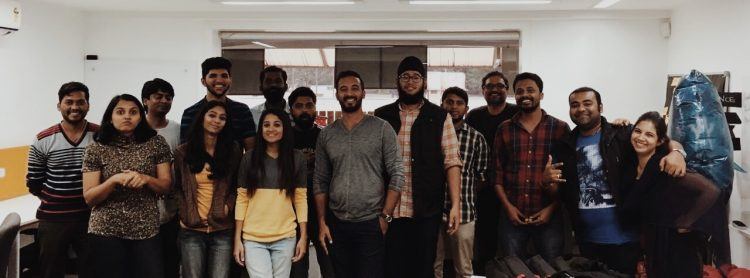
Photo credit: tomwang / 123RF.
A while back, travel industry veteran Vikram Ahuja was approached by a man with a request: could he organize a group trip to nudist-friendly destinations – such as southern France or the east coast of India?
“I was like yeah, sure, hell yeah, for sure,” Vikram tells Tech in Asia. “If you’ve got people who want to do it, absolutely.”
For Vikram, this is the beauty of community-based travel: it helps small and relatively unorganized communities who have the same lifestyle or hobby find each other, and have an immersive travel experience together. So in 2014, he set up his startup Byond Travel, which curates such experiences for a number of communities, including women, “the golden club” (adults over the age of 65), families, and people who love yoga, adventure, cycling, and music and dance.
A group setting is ideal for travelers, especially those who want to go to places that may have an unsafe reputation.
Last month, Airbnb launched a similar service called Trips, which was meant to expand Airbnb from a lodging portal to a platform for community immersion. With 500 experiences available in 12 cities worldwide so far, users can now book itineraries centered around breweries, music and concerts, fire spinning, burlesque, and even social impact.
But Byond seeks to differentiate itself by bringing together people in a common demographic or with a shared passion, then curating a local experience tailored to them. Most of Byond’s travelers are solo adventurers and come to the startup through community leaders – yoga teachers, salsa instructors, etc. A photography-centric group going to Bhutan, for example, visits more scenic areas and have time to take pictures, whereas a self-drive trip in Bhutan spends more time on the road.
Each group on a trip consists of 10 to 12 people. Vikram explains a group setting is ideal for travelers, especially those who want to go to places that may have an unsafe reputation like Cuba, Iran, and Turkey.
He laughs when I ask him about curating the people who sign up to go on the trips. “I wish,” he jokes. It’s an area where the company has room for improvement.
Traveler red flags include people who don’t do well with groups, people who are extremely particular, people who are “too rude,” and someone who won’t pay the set price. Byond has refunded money before in the middle of a trip because of one of those reasons.
See: Big data and machine learning liven up the Indian online travel space
Logistics and localization

Byond’s team. Photo credit: Byond Travel.
Vikram is a multi-talented individual. He’s got a background in writing, acting, dancing, and directing, which comes across in the animated and comfortable way he speaks. He previously worked as a consultant in San Francisco, then in Dubai at deals site Cobone and its travel spinoff Triperna.
In July, Vikram started an early-stage startup accelerator called Kyron in Bangalore, which now works with corporations like Target to set up their startup accelerator programs in India.
“The idea for Byond then came up when we wanted to set up a startup studio and do something in the travel space,” Vikram says. He and his team, all of whom had worked in the travel industry for several years, were looking for something disruptive and different. Community-driven travel caught their eye.
The startup’s own research has found that solo travel – travel without close friends or family – is growing in popularity and will make up 6 to 8 percent of the Indian travel industry by 2018 – that’s 4 million to 8 million people. In particular, solo travel is growing in popularity among Indian women. There are already over 40,000 travel meetup groups across India that have sprouted up on their own.
Byond currently offers trips to 50 countries. Packages roughly range from US$740 (a six-day trip to Vietnam) to US$1,500 (a six-day trip to Myanmar).
Trips include activities for the group, local food, and lodging – one needs to pay for transportation to the destination, though. For example, for a five-day trip to three cities in Vietnam, transportation between the three cities is included, as well as transportation within the city. However, a customer from India and a customer from Canada would both have to pay to get themselves to Vietnam. Byond keeps track of arrivals so no one gets lost.
Vikram says that Byond will arrange flights if requested to allow customers to “do their own thing.” The flight fee would then be added onto the overall cost of the trip.
The company has run 27 trips this year, as well as several private trips. It has a team of 18, and each trip has two staff members – one from Byond’s core team to cultivate the group and one on-the-ground partner to make the travel feel more local. A community leader, like a yoga instructor or meditation guru, may join the group to facilitate activity.
See: Hourly rate hotels get a bad rep. One startup is changing that for bargain travelers
How it makes money
I’ll admit I liked trying out the VR.
Byond has a three-part business model: curated travel packages that get the startup a commission with every sale, content creation for tourism board partners through Byond Studio, and putting on events for corporates.
For events, the startup has a travel storytelling series called the Lime Diaries. It’s a bit like an open mic based around travel, but Vikram sees it as and hopes that one day it’ll be more like TED for travel.
The startup’s done Lime Diaries monthly in Bangalore. Next year, it aims to make it a countrywide event. The day before I spoke to Vikram, Byond was hired by Flipkart to do an event at their headquarters, where an individual stood up and told everyone about his trek to the summit of Mt. Everest.
Byond also expands the travel experience using VR and will use that to monetize in the future, something travel giants like Priceline are already doing. I got to test it out. Over five minutes or so, I’m taken to a 360 view of a safari with giraffes and elephants. The scene fades out, and I’m then at a yoga retreat by a lake. Then, I’m the lone wanderer at the top of a mountain, looking up at a temple larger-than-life. It’s a lot like watching a documentary in a movie theater, but Vikram hopes to make the experience even more immersive.
VR will also improve accessibility, possibly showing someone the final steps to the top of Mt. Everest.
Vikram’s heading to Jordan soon to get more footage for another headset experience. “What we want to do is basically set up experience centers everywhere.” These malls, airports, and other venues will have items on hand to make the experience more genuine, like movable chairs and backpacks. But it will also improve accessibility, possibly showing someone the final steps to the top of Mt. Everest.
For now, Vikram’s focused on next year, and the challenge Byond constantly faces is differentiating itself in a saturated industry that, despite the Airbnbs of the world, is relatively slow to change.
“A lot of it is building awareness,” he says. “Group travel is fairly new. In an Indian context, we’ve had group travel that’s typically for an older audience, or like 15 people in a bus, that’s […] people’s perception, so creating the awareness of this interest-driven travel or community-driven travel is a large part of what we’re aiming to do.”
This post https://www.techinasia.com/byond-travel-community-trips-vr appeared first on Tech in Asia.
from Tech in Asia https://www.techinasia.com/byond-travel-community-trips-vr
via IFTTT
No comments:
Post a Comment